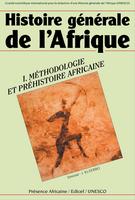Subject
The history of Africa begins with the emergence of hominids, archaic humans and — around 300,000–250,000 years ago — anatomically modern humans (Homo sapiens), in East Africa, and continues unbroken into the present as a patchwork of diverse and politically developing nation states. The earliest known recorded history arose in Ancient Egypt, and later in Nubia, the Sahel, the Maghreb, and the Horn of Africa.Following the desertification of the Sahara, North African history became entwined with the Middle East and Southern Europe while the Bantu expansion swept from modern day Cameroon (Central West Africa) across much of the sub-Saharan continent in waves between around 1000 BC and 1 AD, creating a linguistic commonality across much of the central and Southern continent.During the Middle Ages, Islam spread west from Arabia to Egypt, crossing the Maghreb and the Sahel. Some notable pre-colonial states and societies in Africa include the Ajuran Empire, Bachwezi Empire, D'mt, Adal Sultanate, Alodia, Dagbon Kingdom, Warsangali Sultanate, Buganda Kingdom, Kingdom of Nri, Nok civilization, Mali Empire, Bono State, Songhai Empire, Benin Empire, Oyo Empire, Kingdom of Lunda (Punu-yaka), Ashanti Empire, Ghana Empire, Mossi Kingdoms, Mutapa Empire, Kingdom of Mapungubwe, Kingdom of Sine, Kingdom of Sennar, Kingdom of Saloum, Kingdom of Baol, Kingdom of Cayor, Kingdom of Zimbabwe, Kingdom of Kongo, Empire of Kaabu, Ife Empire, Ancient Carthage, Numidia, Mauretania, and the Aksumite Empire. At its peak, prior to European colonialism, it is estimated that Africa had up to 10,000 different states and autonomous groups with distinct languages and customs.From the late 15th century, Europeans joined the slave trade. That includes the triangular trade, with the Portuguese initially acquiring slaves through trade and later by force as part of the Atlantic slave trade. They transported enslaved West, Central, and Southern Africans overseas. Subsequently, European colonization of Africa developed rapidly from around 10% (1870) to over 90% (1914) in the Scramble for Africa (1881–1914). However following struggles for independence in many parts of the continent, as well as a weakened Europe after the Second World War (1939–1945), decolonization took place across the continent, culminating in the 1960 Year of Africa.Disciplines such as recording of oral history, historical linguistics, archaeology, and genetics have been vital in rediscovering the great African civilizations of antiquity. Source: Wikipedia (en)
Works about history of Africa 14
-
Neue Fischer Weltgeschichte. Band 19: Afrika bis 1850
-
The Political and Social Thought of Kwame Nkrumah
-
The State of Africa
-
Zulu
-
The Political Legacy of Kwame Nkrumah of Ghana
-
La puerta afortunada. Canarias en las relaciones hispano-africanas de los siglos XVII y XVIII
-
Beyond the Execution
History of Black Africa
-
Ecology Control and Economic Development in East African History
-
Technology, Tradition, and the State in Africa
-
Monumenta Missionaria Africana. Volume 1. África Ocidental (1471-1531)
-
The Cambridge History of Africa
-
On the Erythraean Sea
Histoire générale de l'Afrique.
Subject - wd:Q149813

